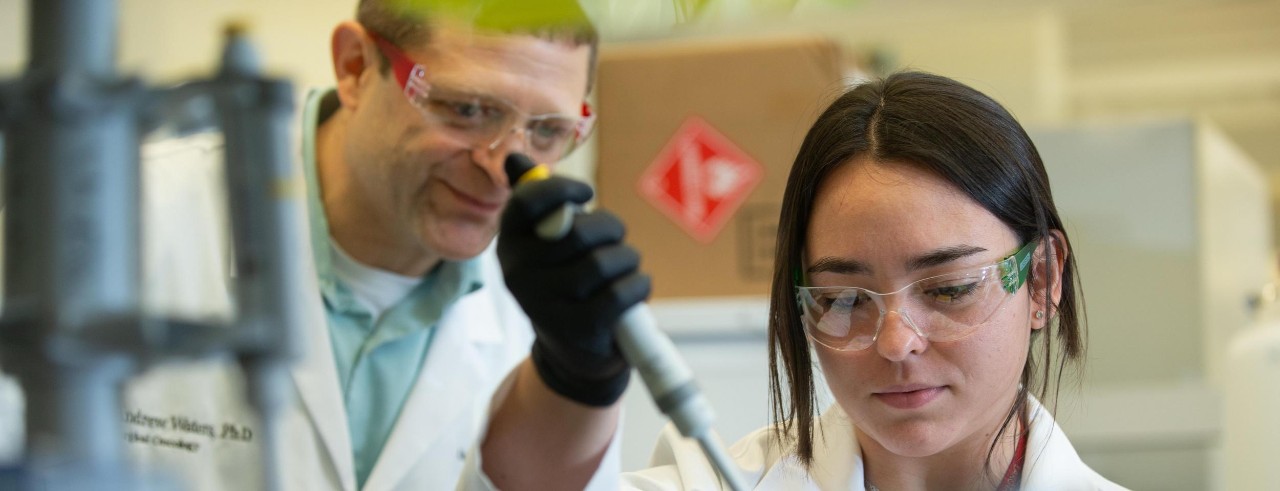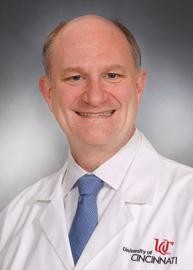
Supporting the next generation of researchers
American Cancer Society awards pilot funding for early-stage investigators
The American Cancer Society has awarded the University of Cincinnati Cancer Center an Institutional Research Grant.
Cancer Center member David Plas, PhD, is primary investigator for the grant, with members Maria Czyzyk-Krzeska, MD, PhD, and Kathryn Wikenheiser-Brokamp, MD, PhD, serving as co-principal investigators.
The American Cancer Society awards Institutional Research Grants to academic and nonprofit organizations that have a track record of outstanding cancer research and a pool of experienced researchers who can mentor junior faculty. The purpose is to support early-stage faculty investigators in initiating cancer research projects so they can obtain preliminary results that will enable them to compete successfully for national research grants.

David Plas, PhD. Photo/University of Cincinnati.
The grant will provide a total of $360,000 in pilot funding over three years.
“I am excited for the benefits that this grant will bring to our early-stage investigators, the added recognition it will bring to the Cancer Center and for the opportunity to further partner with the ACS," said Plas, professor and Anna and Harold W. Huffman endowed chair in glioblastoma experimental therapeutics in the Department of Cancer Biology in UC’s College of Medicine.
"The American Cancer Society is committed to investing in the careers of the best and the brightest early-stage investigators who can bring innovative ideas to the forefront,” said Natasha Coleman, American Cancer Society vice president of community impact. “We are confident that this institutional research grant to the University of Cincinnati Cancer Center, with leadership and expertise from co-investigators Dr. David Plas, Dr. Maria Czyzyk-Krzeska and Dr. Kathryn Wikenheiser-Brokamp, will provide essential mentoring to launch new researchers who are able to further our understanding of cancer and its treatment.”
"Receiving this award from the American Cancer Society is a validation of the cancer research happening across campus and our commitment to developing junior faculty. This award puts us in good company with peer institutions, including Case Comprehensive Cancer Center at Case Western Reserve University and Markey Cancer Center at the University of Kentucky. We are incredibly proud of the work the grant co-PIs put into receiving this award, and we are excited for the impact this will have on our early-stage investigators," said Syed Ahmad, MD, and William Barrett, MD, co-directors at the University of Cincinnati Cancer Center.
Over the next three years, up to nine early-stage Cancer Center investigators will benefit from this new pilot program. With matching funds provided by the Cancer Center, each funded investigator can receive up to $80,000 in support. Information on eligibility and how to apply will be available later this year.
Brad McElhaney
Director of Membership Communications & Marketing, University of Cincinnati Cancer Center
Impact Lives Here
The University of Cincinnati is classified as a Research 1 institution by the Carnegie Commission and is ranked in the National Science Foundation's Top-35 public research universities. UC's medical, graduate and undergraduate students and faculty investigate problems and innovate solutions with real-world impact. Next Lives Here.
Featured photo at top: Research assistant Grace Goodhart, right, works in the laboratory as Andrew Waters, PhD, left, looks on. Photo/Andrew Higley/UC Marketing + Brand.
Related Stories
'Paradigm-shifting' study confirms effectiveness of long-acting HIV treatment
February 26, 2026
The results of a clinical trial involving the University of Cincinnati, recently published in The New England Journal of Medicine, show people failing HIV treatments with oral medications were able to be treated successfully using injections.
How do horses whinny?
February 26, 2026
A horse makes the low-pitched part of its whinny by vibrating its vocal cords — similar to how humans speak and sing — and the high-pitched part by whistling with its voice box, according to a new paper published in the journal Current Biology and featured in Smithsonian magazine.
UC receives grant for AI use in medical education
February 26, 2026
The University of Cincinnati is turning to artificial intelligence to help solve a problem in medical training. The College of Medicine was awarded a grant valued at more than $1 million to use AI in advanced physician training through personalized learning.